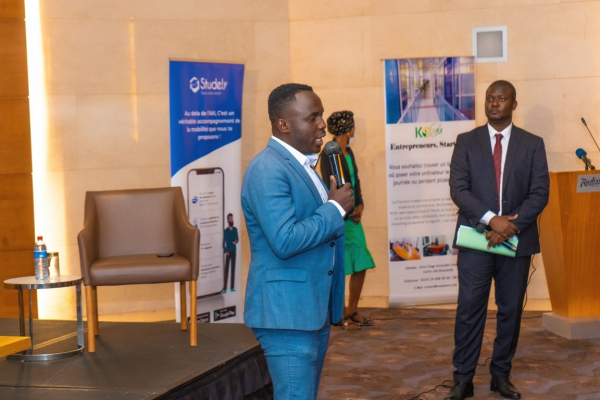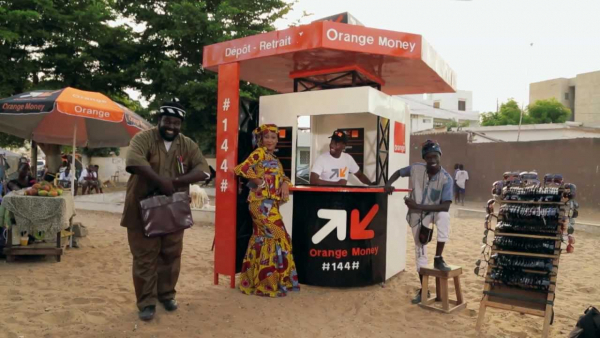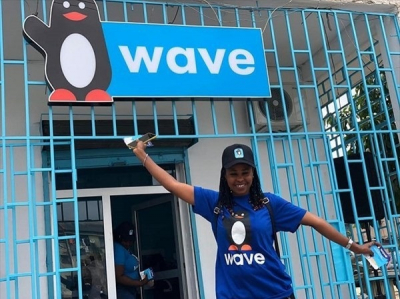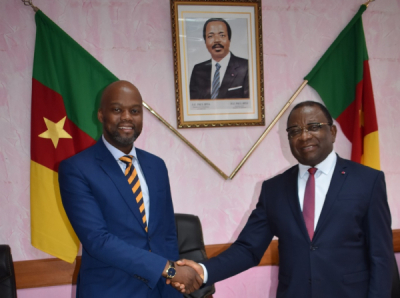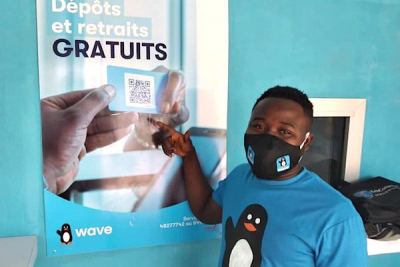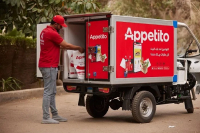
Finance (113)
In Africa, fintech startups are gradually gaining ground, offering exclusive services to users. Thanks to its new mobile app, Studely becomes the first startup to allow students to remotely open a bank account in Paris.
Cameroonian consulting firm Studely launched Friday (July 22), its fintech app StudelyApp in Brazzaville, Congo. The app was launched during a ceremony attended by administrative authorities, entrepreneurs and students.
According to Studely co-founder and CEO Duplex Kamgang (photo, left), the mobile app complements the visa assistance services rendered by Studely.
“StudelyApp has been developed [...] to help students remotely open a bank account in Paris. It gives them the possibility to become banked while facilitating the payment of their school and housing fees. When they enter France or Germany, they just have to purchase a Mastercard for their bank transactions,” he explains.
The innovation was praised by Congolese Minister of Digital Economy Léon Juste Ibombo, who estimated that the app would enrich the Congolese ecosystem of practical solutions addressing the challenges faced by students who travel abroad. With its new service, Studely becomes the first global startup to develop a solution for the problems faced by students when they are required to pay their school ad housing fees before landing in Europe for their studies. The app is already available for Android devices. In the coming days, it will also be available for iOS users.
Studely was founded in 2015 to assist students in the visa application process for their studies in Europe, France, and Germany notably. Its assists in the obtention of proof of financial support, accommodation research, travel or home insurance, and bank account opening. The fintech is already present in fifteen countries and claims over 10,000 students assisted.
Before launching the StudelyApp in Congo, it had already launched the solution in Gabon and the Democratic Republic of Congo.
Samira Njoya
In Africa, mobile money has become the most popular alternative to bank accounts. In that promising ecosystem, the competition is ever high, supported by development partners willing to boost financial inclusion.
The International Finance Corporation (IFC) announced, Wednesday (July 13), a partnership agreement with Orange Bank Africa (OBA) to support digital finance services. Notably, the agreement will improve access to finance for agents and merchants operating in the West African mobile money ecosystem.
"Through the partnership with IFC, our bank aims to strengthen its collaboration with the thousands of agents and merchants, in particular in rural areas, who play a key role in the mobile money ecosystem. More generally, this project is in line with our mission to improve access to financial services in the region by leveraging transformations in the digital sector,” said Jean-Louis Menann-Kouamé, CEO of Orange Bank Africa.
The two partners will carry out a pilot phase in Côte d’Ivoire by providing liquidity to Orange Money agents to help them meet their clients’ needs. Indeed, agents, who are mostly underbanked, usually face liquidity constraints and are sometimes forced to reject transactions. As a result, they hinder both their growth and financial inclusion.
In addition to providing access to financing for Orange Money agents, “IFC will provide advisory services to Orange Bank Africa to help the mobile bank develop and test innovative and scalable digital lending products that meet the specific needs of mobile money agents as well as merchants accepting this type of payment.”
The partnership signed by the IFC and Orange comes a few days after Wave, one of Orange's competitors, secured a €90 million financing package arranged by the IFC. At the time, the IFC explained that the financial support “will help establish a mobile money environment where customers can transact more often thanks to a simple fee structure and lower transaction costs.”
Samira Njoya
The number of mobile financial service subscribers rose significantly in Africa over the past ten years. According to the GSM Association, it is estimated at some 200 million subscribers currently. With the arrival of new ambitious actors, the high fees, which used to hinder mobile financial services adoption, are dropping.
Wave Mobile Money S.A. (Senegal) and Wave Côte d'Ivoire S.A. recently secured a €90 million financing package arranged by the International Financial Corporation ( IFC). The package includes a €25 million loan from the IFC, and a combined €41 million B loan - Ed.note: Repayable over 5 to 8 years with the possibility to pay a large portion of the loan in the last amortization year- from Symbiotics, Blue Orchard, responsAbility and Lendable. The remaining €24 million is a parallel loan -not exposed to currency fluctuation risks- from Finnfund and Norfund.
The funds secured will serve for the development of Wave’s activities in Senegal and Côte d’Ivoire. According to an IFC release dated July 6, “in addition to helping to finance the companies' operations, IFC's support will help establish a mobile money environment where customers can transact more often thanks to a simple fee structure and lower transaction costs.”
“This will foster higher frequency of transactions, new payment methods, and growing overall value of payments processed by the users, particularly among lower-income customers,” the release adds.
“Wave's vision of making Africa the first cashless continent, by building affordable and user-centric solutions, matches IFC's ambitions of universal financial inclusion. [...] This investment by IFC and other lenders helps us offer a diversity of financial products, encouraging users to stay within the formal financial sector, deepening financial inclusion in the region,” indicated Coura Sene, Wave’s Mobile Money Regional Director for the West African Economic and Monetary Union (WAEMU).
For Aliou Maïga, IFC's Regional Director for West and Central Africa, the loans “will not only promote inclusive finance, but it will also significantly contribute to further advancing digital economy solutions in West Africa.”
Let’s note that in September 2021, Wave Mobile Money Holdings Inc. (parent company of Wave Mobile Money S.A. (Senegal) and Wave Côte d'Ivoire S.A.) raised US$200 million during a Series A round, becoming a unicorn company (valued at over US$1 billion).
Muriel Edjo
In 2021, Africa officially became a common market with numerous trade facilitation mechanisms. However, non-tariff barriers still pose challenges during financial transactions notably, therefore threatening the business inclusion sought after.
The African Continental Free Trade Area (AfCFTA) recently presented a project for the development of an e-payment platform dedicated to African SMEs. The project was presented by Wamkele Mene (photo, left), AfCFTA secretary general, during a meeting with Cameroonian Minister of Trade Luc Magloire Mbarga Atangana (photo, right) in Yaounde, last Monday (June 27).
According to Wamkele Mene, the end goal of the project is to create a digital marketplace to facilitate trade. For that purpose, the AfCFTA is negotiating with banks to secure guarantees because SMEs are usually confronted with credit access challenges. With those bank guarantees, SMEs can transact through the e-payment platform while banks cover the risks. Four sectors are targeted for the first phase of the project. They are notably agriculture, textile, transportation, and the pharmaceutical industry.
The AfCFTA is a key initiative in the African Union’s development blueprint Agenda 2063. It aims to accelerate intra-African trades and consolidate the continent’s commercial position in the global market. Currently, the area includes 44 member countries, including Cameroon.
S.A.
Since the launch of its activities over a year ago, the fintech is highly praised by users. However, its partners’ discontent is growing because they fear its operating model could have a negative impact on financial inclusion and job creation in the long term.
On June 24, 2022, in Côte d’Ivoire, telecom operators and U.S Fintech Wave carried out a consultation meeting to elaborate a fee grid that would be beneficial for electronic money users, service providers, and electronic money issuers. According to the national union of mobile money agents Synamcil, no effective resolution came out of the meeting instructed by the Minister of Employment and Social Protection.
Ivorian mobile money agents will therefore have to wait a bit longer for a clear answer to their request for the improvement of their incomes, which is dwindling since April 2021 when Wave officially entered the local market with greatly reduced fees.
Meanwhile, hoping for an ultimate solution to the situation, the case will be transmitted to the Prime Minister, with minutes of the various meetings initiated by the Ministry of Employment and Social Protection. For the time being, mobile money agents will only have to continue operations as usual hoping their job would not become unprofitable in the long term.
An annoying business model
Since June 1, 2022, the Ivorian mobile money market is shaken by fintech Wave’s decision to introduce a new price grid that reduces the commission paid to mobile money agents. According to Felix Coulibaly, secretary-general of Synamcil, the commissions were reduced by about 40 percent going from XOF2,400 to XOF1,350 for some transactions and XOF4,600 to 2,675 for others.
“When Wave reduced the commissions we used to collect, it also introduced a new system called ‘revenue sharing’. We rejected that system because we believed it was not transparent since we had no visibility on the inner workings,” he explained.
Despite the agents’ opposition, Wave insisted on implementing its new price grid, leading some agents to go on strike from June 2 to 4, 2022. The grid was finally canceled during a meeting with unions operating in the electronic money segment, telecom operators, Wave, and the Ministry of Employment on June 17.
Agents then unilaterally decided to impose a XOF100 fee on deposits and withdrawals. The aim, according to Felix Coulibaly, was to allow agents to “make ends meet… let them earn enough to cover operating charges until the Minister of Employment helps find a solution” to the problem.
For the secretary-general, the 1% model touted by Wave is not that realistic and could have a negative impact on the market. “The three telecom operators used to pay us commissions for every transaction… Since April 1, Orange has decided to copy Wave’s operating model by paying us commissions for cumulated daily transitions. What we are holding against Wave is its model, which changed the market and reduced our commissions. Its Wave’s arrival in the market that caused all those problems. They [Wave executives] have always claimed that their model is tested and proven and that reshaping it would destroy it. They did not bring only problems to the market. In fact, thanks to them, the population is now aware that it is possible to collect just 1% fee on electronic transactions. Even we, agents, were not aware of such a possibility. It is now up to them to prove to the Ivorian state that they have a sustainable model,” he indicated.
Threat to financial inclusion
“The Ivorian mobile money market was relatively peaceful before Wave’s arrival. Transaction fees were about 2 to 3 percent. Every operator had a well-defined grid. Everything was fine until Wave entered the market. When it introduced a new model to the market, it disrupted everything,” says Sidibe Aboubacar, chairman of the Ivorian independent mobile money vendors’ union Amimomoci.
He explained that in October 2020, when Wave first started operations in Côte d’Ivoire with its 1% fee model, users were enthusiastic because the other operators’ fees were averaging 1 to 1.8 percent. While users were praising the model, it was destroying vendors’ income, he added. For four to five months, telecom operators maintained their commission level, they finally took measures since they were losing market share. MTN and Moov reduced their commissions while Orange completely changed its business model.
Apart from the reduced commissions that affect mobile money agents’ income, the other grievance Sidibe Aboubacar nurses against Wave is its propensity to make agents pay for the weaknesses of its economic model. “When Wave says fee-free deposits and withdrawals, some users deposit money in their account in Abidjan and go withdraw it [the same day] in Yamoussoukro. In that case, Wave will not pay commission to the two agents involved here because the transaction did not generate commissions. It sometimes even claims that the mobile money agents are complicit with the clients that act in that manner. We deem this treatment unfair,” he confided.
Mobile money fears job losses due to some outlets becoming unprofitable and therefore shutting down if the government does not find a sustainable solution for the fee problem. Failure to find a solution will also affect financial inclusion. The population could also be forced to go miles and spent transport fees just to carry out financial transactions they can currently perform in their immediate neighborhood.
Muriel Edjo
In Nigeria, a new trend is developing with the booming e-commerce market. That trend in social commerce encourages social interactions and good bargains.
Fintech platform PocketApp recently secured an Approval in Principle (AIP) from the Central Bank of Nigeria (CBN) to become a mobile money operator. The approval was announced, Monday (June 27), by Piggytech Global Limited. It is the first step before the obtention of a mobile money license.
“For the last 18 months, we have been focused on building the core infrastructure that will enable us to secure social commerce and payments at scale. We believe that social commerce will thrive better in a more trusted environment. So we added escrow to our payment infrastructure, protecting buyers and sellers and many other features, ensuring a smooth shopping experience on the app,” said PocketApp COO Patricia Adoga.
PocketApp was launched, in 2021, as Abeg App. It was then specialized in money transfer but, over the months, it shifted to connect buyers and sellers in Nigeria. To date, it has two million users. It intends to add new features and target the whole African market.
Thanks to the mobile money license, PocketApp will be able to create and manage mobile money portfolios, issue electronic money, and payment cards as well as every other service authorized by the CBN.
According to Research&Markets, Nigeria’s social commerce industry would grow by 82.4% annually to reach US$1,003.8 million by end 2022 and US$23,817.4 million by 2028.
Muriel Edjo
The mass retail industry is booming in Egypt since 2020. The boom is attracting new actors who either want to capitalize on the commercial opportunities or offer new financial products.
Tanmeyah Microenterprise Services, a leading microfinance institution in Egypt, recently acquired Fatura, a startup that connects suppliers with retailers. The information was disclosed on Wednesday, June 15, but the amount of the transaction was not stated.
According to Karim Awad, CEO of Tanmeyah’s parent company (EFG Hermes Holding), the deal marks a major milestone for the Egyptian microfinance institution. “This acquisition marks a major milestone for Tanmeyah, which has grown to become a key player under our Non-Bank Financial Institutions (NBFI) platform. Tanmeyah turned to this strategic acquisition to bolster its digital transformation and enrich its product and service offerings to become more holistic and support Egypt’s microfinance space. [...] We’ve always seen potential in Fatura, and we are firm believers in its ability to innovate in the B2B digital space, which is why our very own EFG EV Fintech made the decision to become one of the early investors in the company years ago,” he commented.
Fatura started operations in Egypt in 2019. In July 2020, the startup successfully raised about US$1 million in its seed round led by Disruptech with EFG Hermes and The Cairo Angels and angel investors as participating investors. In June 2021, it raised another US$3 million in a pre-series A round led by Sawari Ventures, Arzan VC, Egypt Ventures, EFG-EV, The Cairo Angels, and Khwarizmi Ventures. Within three years, it expanded its presence to 22 governorates in Egypt. It also built a network of more than 60,000 merchants.
Muriel Edjo
The fintech’s mission statement is “to enable lenders to unlock economic inclusion for African businesses and consumers.” With the funds secured, it plans to further the mission.
Nigerian fintech startup Indicina announced, Monday (June 6), the successful completion of a US$3 million seed funding round to accelerate African expansion. Led by tech investment firm Target Global, the operation had Greycroft and RV Ventures as participating investors.
According to Indicina co-founder Yvonne Johnson (photo), the Nigerian fintech wants “lenders to be better informed about the decisions around credit so they can go to market faster with their digital products.”
“So we’ve never had a business model that included our balance sheet, which we’ve always worked with the lenders,” she told Techcrunch.
Indicina was founded in 2018 by Carlos del Carpio, Jacob Ayokunle, Yemi Ajao, Yvonne Johnson. Apart from Nigeria, it is also present in Kenya. It offers machine learning solutions that improve individuals' and businesses’ chances to get access to credit. As company insight platform Crunchbase puts it, it “provides analytics-driven credit decisions for lenders.”
The fintech claims more than 100 active clients (lenders), which it helped process over NGN3 billion (US$7.2 million) loans and disburse over NGN700 million. Since its launch in 2018, Indicina has raised some US$7.2 million to upgrade its technology and hire more talents.
Adoni Conrad Quenum
After a pre-series A operation in November 2021, Appetito is acquiring Tunisian peer Lamma through a merger by absorption deal. Once completed, the process will create a new major q-commerce and e-commerce player.
Grocery delivery startup Appetito announced Wednesday (June 1), the acquisition of its Tunisian peer Lamma. The startup did not disclose the acquisition value but several media suggest it is between US$10 and 15 million.
The two startups decided to merge their operations under the brand Appetito, which will be operational in Morocco and Tunisia (Lamma’s markets) and expand into new West African territories.
“We believe it’s the best time to expand in Africa to solve the huge inefficiencies in the retail supply chain […] Having Lamma on board will put us on track to become the largest q-commerce player in the continent, transforming the lives of millions of people and creating thousands of direct & indirect jobs,” said Appetito’s CEO Shehab Mokhtar.
The acquisition deal is announced seven months after Appetito raised US$2 million in pre-series A funding, last November. The funds raised were used to expand the startup’s presence in Egypt and plan for regional growth.
Once completed (by Q3-2022), the merger by absorption plan will make Appetito the largest q-commerce and e-commerce player in Africa. From the three markets where it operates (Egypt, Morocco, and Tunisia), it will enter new continental markets, starting from West Africa.
According to Shehab Mokhtar, the q-grocery market still has strong growth potential. To illustrate his point of view, he informed that just 2% of the operators in Egypt’s US$60 billion grocery market are online. Also, the Middle-East and West African markets are fragmented and only a few firms have already succeeded in becoming major regional e-commerce players, he added.
Chamberline MOKO
In the aftermath of the Covid-19 crisis, the competition got tougher in the African mobile financial service market. The competition was led by both conventional and unconventional service providers, which are aggressively introducing ever-diversified offers. The market is now witnessing an all-out battle for opportunities.
In the past ten years, the mobile money sector greatly expanded in Africa. In 2012, less than 80 mobile financial services were present on the continent. This number rose to 173 with 621 million registered accounts and US$36.7 billion worth of transactions in 2021. The volume of transactions recorded that year was up by 23% compared with 2020 figures.
In 2021, the volume of mobile money transactions rose by 39%, year-on-year, to US$701.4 billion. The rapid expansion of the market is attracting and supporting the emergence of new players, like fintech startups. Over the past five years, the number of fintech start-ups active on the continent rose significantly, and so did the transactions they processed and the financing they raised. Some of them have been able to affirm their positioning in their home countries and even launch international expansion plans. They have now become competitors to mobile money operators but, the battle between those two economic models will surely be long since both of them have their strengths and weaknesses.
Investment volume
Since the launch of the mobile money in Africa in 2007, telecom operators have invested millions of dollars to upgrade the mobile network necessary for the transactions. They also invested in the deployment of agent networks and the development of efficient and secure software, databases, and systems to guarantee smooth transactions.
Fintech startups have also made substantial investments but the volume is far less than that made by mobile money operators. Like mobile money operators, fintech startups also invested in the development of IT systems and agent networks to support their businesses. However, they do not have mobile networks to maintain regularly. So, they have less investment requirements. Nonetheless, they need to invest heavily in high connectivity to be able to track financial transactions in real-time.
The offers
Fintech startups are succeeding because they target underserved individuals and new markets like the micro-credit segment. For Said Bourjij, an expert in finance and development (French-speaking Africa and the Mediterranean basin) and Managing Director of Epargne Sans Frontière, fintech leverages digital tools to respond to users’ needs. Their offers are dynamic but don’t cover the whole financial sector, he adds.
Over-time Mobile money has also evolved and can offer all the services offered by fintech startups. Mobile money operators like Safaricom’s M-Pesa, Orange Money, and MTN Mobile Money are already doing so in some countries. Apart from simple transactions, they added a spectrum of services like merchant and invoice payment, international transfers, micro-savings, microloans, etc. Their platforms are also dynamic.
Thanks to the dynamic of its offers and its platform, M-Pesa became Safaricom Kenya’s main growth driver in 2021 by generating 38.3% of the operators’ annual turnover (US$2.5 billion).
Accessibility
According to the GSM Association (GSMA), mobile Internet penetration was 28% in sub-Saharan Africa in 2020, and mobile penetration was 46%. In its report "The Mobile Economy Sub-Saharan Africa 2021", the Association explains that of the 1084 million people in the region, 303 million (28%) were connected, 206 million (19%) were not covered by a mobile network and 575 million (53%) were living in areas covered by mobile broadband networks but were not yet using mobile Internet services.
The GSMA added that smartphones accounted for less than 50% of the number of mobile connections while feature phones accounted for 45% of all the mobile connections during the period.
At the time, urban populations were more likely to use mobile internet than those in rural areas. So, fintech startups whose services were accessible mainly via the internet could only meet the needs of urban populations. On the other hand, mobile money operators are accessible to both urban and rural populations. So, they have an edge over fintech startups here.
“Mobile money is an enabler of many other services that can help solve critical socio-economic and environmental challenges, such as providing access to essential utilities, sustaining the livelihoods of smallholder farmers, and delivering rapid financial relief to vulnerable populations,” the GSMA explains.
Fees
Mobile money operators and fintech startups are almost offering the same services but they are not targeting the same niches. Some startups target the rural population and use affordable pricing as their main selling point in urban areas.
Mobile money operators criticize the pricing strategy adopted by fintech startups but, in the end, it contributes to lowering fees paid by users. In countries like Senegal and Côte d'Ivoire, the pricing strategy adopted by fintech startups led mobile money operators to reduce fees on their mobile money services.
In 2020, the GSMA was warning about the aggressive pricing strategy widely adopted by fintech startups. It then asked mobile money operators to diversify their income streams to avoid relying solely on fees paid by users. Indeed, in June 2020, providers that took part in the Global Mobile Money Adoption Survey reported that about 87% were generated by users’ fees.
The GSM Association pointed out that mobile money operators’ heavy reliance on transaction fees could expose them to short-term shocks.
“In addition to insulating mobile money providers from short-term demand shock, diversifying to high-value segments may also benefit users, as services can be offered at more competitive rates,” the association argued.
Regulatory framework
In some markets, the regulatory framework forced telecom operators to create a separate entity that will manage their mobile money activities. The new entities are subjected to strict legal frameworks set by the central banks of the regions or countries where they operate.
Depending on the type of services offered, there are legal requirements clearly defining the scope of their operations. Fintech startups that wish to offer similar services like the one offered by mobile money operators are subjected to the same regulation. In the West African Economic and Monetary Union (WAEMU), the central bank BCEAO strictly applies the regulation.
The requirement to create a separate entity for mobile money operations may prove an advantage for telecom operators, who could thus be freed from the requirements to maintain telecom networks and just concentrate on innovating and creating added value.
Even though there could be competition between mobile money operators and fintech startups, the GSMA praises their combined impacts on financial inclusion in Africa. It also encourages them to be more committed to users, whose choices will ultimately determine whether they are profitable or not.
Muriel Edjo
More...
Kenyan telecom operator Safaricom and Islamic bank Gulf African Bank recently launched a Sharia-compliant mobile loan called Halal Pesa.
Thanks to the solution, users can receive up to Ksh20,000 loans fully repayable within 30 days with a 5% “commodity Murabaha margin.”
For Safaricom, Halal Pesa is “the first Sharia-compliant mobile and digital financial solution” in Kenya.
“Kenya is now a highly innovative, interconnected, and fast-paced community that requires solutions on the go. All our digital offerings, including Halal Pesa, seek to directly address this aspect. Our current strategy is focused on digitization for financial inclusion,” said Abdalla Abdulkhalik, Managing director of Gulf African Bank.
French banking group Societe Generale is ending its mobile money service YUP, created in 2017, in Côte d'Ivoire, Senegal, Burkina Faso, Cameroon, Guinea, Ghana, and Madagascar. The information was disclosed in a letter sent on March 1, 2022, by Nicolas Pichou, CEO of Societe Generale Cameroon, to his employees.
"Dear colleagues, 5 years ago, anxious to promote financial inclusion and facilitate access to innovative fund transfer means by notably dematerializing companies’ payment flow, the AFMO (Ed.note: Africa and the Middle East) Business Unit launched an electronic money service and created a dedicated entity YUP. Despite all the efforts made by the YUP teams in the 7 geographic zones concerned, including Cameroon, to develop our market share and improve the experience, the service has not succeeded in creating a viable model and the market outlooks do not comfort us in planning for the continuation of this segment. In that circumstance, Societe Generale Group, in consultation with all its local subsidiaries, took the difficult decision to stop the operations of YUP in all the geographic areas where it was deployed,” explains the letter sent by Nicolas Pichou.
In short, despite all the resources deployed over the past five years to capture shares of the highly dynamic mobile money market, YUP has proven unprofitable for Société Générale. In the case of Cameroon, the reason for this failure is the undisputed supremacy of the country's two main mobile operators (MTN and Orange namely) in this market. Those operators entered the local market almost ten years before YUP and have had the opportunity to establish a network that leaves almost no room for newcomers.
Over 19 million active mobile money accounts
In July 2021, when celebrating its 10th anniversary in the Cameronian mobile money market, Orange Cameroon claimed it was controlling 70% of the market share, with cumulative transactions amounting to CFA800 billion yearly. "When I say cumulative transaction values, I mean deposits and withdrawals, money transfers, bill payments, salary payments, and everything else that is merchant payment, etc. Our daily cumulative transactions amount to CFA3 million,” explained Emmanuel Tassembedo, director of Orange Money Cameroon.
MTN Cameroon is a bit cautious as far as its mobile money market share is concerned. Its executives claim MTN Mobile Money had 5.6 million active subscribers in the second quarter of 2021, at least 168,000 points of presence across the country, including 108,000 merchant points and 60,000 distribution points.
Both operators offer innovative services like insurance subscriptions and tax payments. According to the Ministry of Finance, in Cameroon, close to CFA10 billion of taxes were paid through the two mobile money operators.
Let’s note that Cameroon is CEMAC’s leader in the mobile money segment. According to data published by the central bank BEAC, in 2020, there were 19.1 million active mobile money accounts in Cameroon. This was 64.8% of the 30.1 million mobile money accounts active in the CEMAC region whose membership includes six countries (Cameroon, Congo, Gabon, Chad, the Central African Republic, and Equatorial Guinea). During the period, mobile money service providers active in Cameroon carried out 73.13% of the transactions recorded in the community space.
Brice R. Mbodiam
Achieving a digital economy is a priority in the New National Development Plan (NDP) 2021-2025, unveiled in December 2021 by President Muhammadu Buhari. Several international partners expressed intentions to support the project.
The European Union has announced an investment of €820 million to support Nigeria’s digital transformation over the next three years. The information was unveiled on Saturday, February 12 in Lagos by an adviser to the Executive Vice President of the European Commission, Alejandro Cainzos. This was during a roundtable discussion with Nigerian youth organized at the Tony Elumelu Foundation.
“The EU will support building the fiber optic cables and data centers needed to improve Nigerian’s access to high-speed connectivity. The European Investment Bank (EIB) will invest €100 million to expand secure 4G connectivity in Lagos and Ogun States and triple the national data capability,” said Alejandro Cainzos.
He said the EU will also support the digitization of the Nigerian administration to enable citizens to benefit from better and more easily accessible public services. €250 million will be invested to strengthen Nigeria's digital identity infrastructure with the highest data protection standards and support the creation and scaling of tech startups and stimulate innovative solutions for Nigeria's society and economy.
The EU will help develop regulatory frameworks with the highest standards of privacy, security, and cybersecurity, while promoting an open Internet and a digital market that respects citizens' rights, Alejandro Cainzos said.
The EU investment in Nigeria came two days after the organization announced an investment of more than €150 billion in Africa over the next five years. European Commission President Ursula von der Leyen was in Dakar on Thursday, February 10, just days before the European Union-African Union summit to be held on February 17-18 in Brussels, Belgium.
Last year, the Nigerian government unveiled a new National Development Plan 2021-2025 which places digital technology at the heart of many growth issues.
Muriel Edjo
Seven months after an initial investment, the Sawiris family office made a follow on investment in Egyptian propTech company Nawy. In a February 13 statement, the beneficiary reported it has raised $5 million in seed capital.
The resources will be used to support its expansion strategy in North Africa and improve investment in new technologies and the digital (artificial intelligence, machine learning, etc.).
The startup, which facilitates and simplifies the process of buying and selling real estate online, claims to have helped more than 60,000 people find a home to date. Nawy also says it has sold over $200 million worth of real estate through its platform.
"We were one of the first investors in Nawy because we saw the potential of the company and shared its ambition. We immediately increased our investment when we realized how fast they were expanding and the trajectory of the company coming to fruition. We are very excited about the future, especially as Nawy expands its services and continues its momentum in the real estate market," commented Onsi Naguib Sawiris, head of Sawiris family office who led the investment in Nawy.
As a reminder, the Sawiris family office led an undisclosed seed funding in Nawy in July 2021. The money was used to strengthen the company's technology, increase services and increase staff. In its July 2021 forecast, Nawy planned to end the year with 300% revenue growth.
Chamberline Moko


